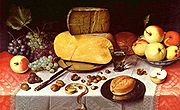- Elevenses
-
Part of a series on Meals 
Common meals Breakfast · Brunch · Lunch · Tea · Dinner · Supper Components & courses Amuse-bouche · Appetizer · Cheese · Cocktails · Dessert · Drink · Entrée · Entremet · Fruit · Main course · Nuts · Salad · Side dish Related concepts Banquet · Buffet · Cuisine · Eating · Etiquette · Food · Global cuisines · Outline of cuisines · Snack In the United Kingdom, Ireland and some Commonwealth realms, elevenses is a snack that is similar to afternoon tea, but eaten in the morning.[1] It is generally less savoury than brunch, and might consist of some cake or biscuits with a cup of coffee or tea. The name refers to the time of day that it is taken: around 11 am. The term is first attested, in East Anglia, as elevens (1849), elevenses appearing first in the record in 1889. Along with fourses, it seems originally to have been a lower-class usage, but by the middle of the twentieth century was associated with middle class language and culture.[2]
In Australia and New Zealand, elevenses are called morning tea or smoko (often little lunch, recess or playlunch in primary school). Choice of foods consumed at morning tea vary from cakes, pastries or lamingtons, or biscuits, to just coffee. In the Royal Australian Navy it is commonly referred to as "Morno's".
In the United States, elevenses refers to the antiquated custom of the late-morning whiskey break. [3]
In Sweden elevenses is a tradition mostly associated with elderly people, the Swedish word is "elva-kaffe" meaning "eleven-coffee". It is often served with some kind of cookie but the main focus is on the coffee.
In many Spanish-speaking cultures the term las onces (the elevens in Spanish) is used to describe a similar meal. Among Chileans, the tradition was known as under the same name, although in modern times, it has shifted in most respects to later in the afternoon, more closely reflecting the pattern of British "tea time".[4]
Contents
In literature
For elevenses, Winnie-the-Pooh preferred honey on bread with condensed milk. Paddington Bear often took elevenses at the antique shop on Portobello Road run by his friend Mr. Gruber.
In the Middle-earth universe by J. R. R. Tolkien (The Lord of the Rings), it is a meal eaten by Hobbits between second breakfast and luncheon.[5]
The term appears extensively throughout the novel Don't Stop the Carnival, by Herman Wouk, in which various characters gleefully partake of "elevenses" at every opportunity, usually accompanied by alcoholic beverages. The idea also appears in Ballet Shoes and other Shoes books by Noel Streatfeild, and in Thursday's Children,[6] Listen to the Nightingale[7] by Rumer Godden.
Elevenses are also featured in the Daisy Dalrymple, an Honorable Miss, mysteries series set in the period after World War I by Carola Dunn.
See also
References
- ^ Harper, Timothy (1997). Passport United Kingdom: Your Pocket Guide to British Business, Customs and Etiquette. World Trade Press. ISBN 1885073283.
- ^ Oxford English Dictionary Online, http://dictionary.oed.com/, s.vv. elevenses, eleven §C.
- ^ Pollan, Michael (October 12, 2003). "THE WAY WE LIVE NOW: 10-12-03; The (Agri)Cultural Contradictions Of Obesity". The New York Times. http://www.nytimes.com/2003/10/12/magazine/the-way-we-live-now-10-12-03-the-agri-cultural-contradictions-of-obesity.html?scp=4&sq=elevenses&st=cse.
- ^ Collier, Simon (2004). A History of Chile, 1808-2002. Cambridge University Press. ISBN 0521534844.
- ^ Tolkien, J. R. R. (1954), The Fellowship of the Ring, The Lord of the Rings, Boston: Houghton Mifflin (published 1987), Chapter 1: A Long-Expected Party, ISBN 0-395-08254-4
- ^ http://www.amazon.com/dp/0330324799
- ^ http://www.amazon.com/dp/0140360913
External links
Categories:- Meals
- Tea culture
- Chilean culture
Wikimedia Foundation. 2010.
